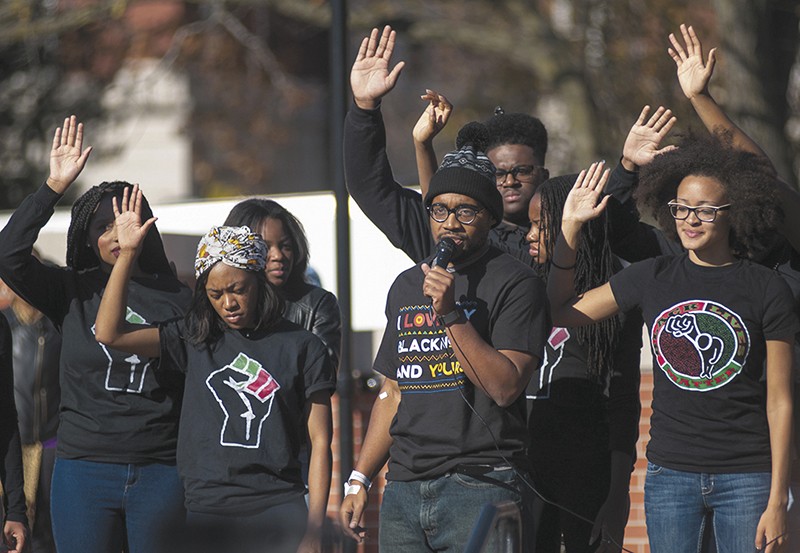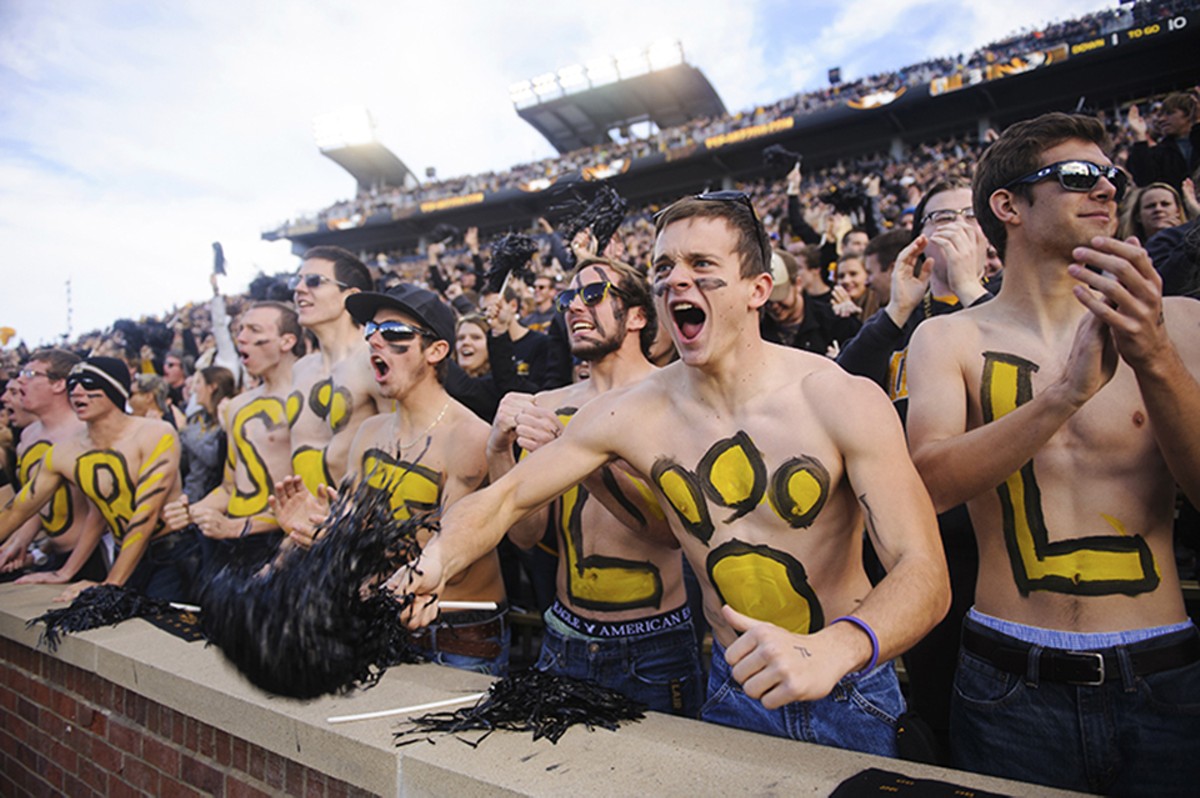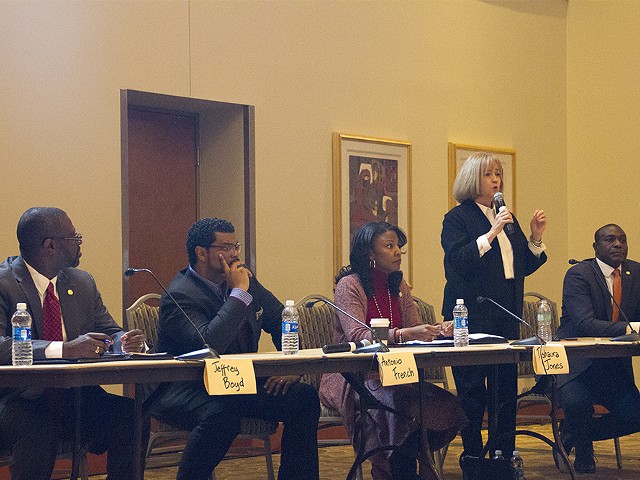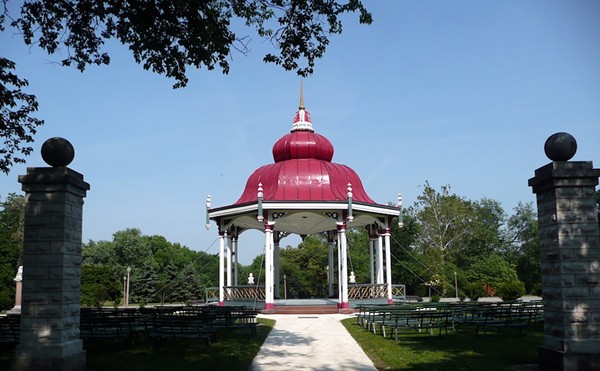
In the first semester of 2015, after a series of hateful acts towards minorities — the then-student government president, who is black, said people riding in the back of a pickup truck called him a racial slur; a white student disrupted a Legion of Black Collegians gathering and began shouting the same word; a swastika drawn with human feces was reportedly discovered in a residence hall — some students felt the university administrators did not adequately respond to the incidents and arranged an encampment at a campus quad. They called themselves "Concerned Student 1950," referring to the year the school admitted its first black student.
One member sent a letter to the University of Missouri Board of Curators saying that he would not "consume any food or nutritional sustenance at the expense of my health until either [university president] Tim Wolfe is removed from office or my internal organs fail and my life is lost."
Five days after the start of the hunger strike, a significant number of black football players tweeted a photo of themselves with arms locked and said that they would not participate in any "football-related activities" until Wolfe was gone. A day later, black and white players and coaches, including head coach Gary Pinkel, tweeted a photo of themselves with the caption "The Mizzou Family Stands as one." The next day, Wolfe resigned.
Since then, enrollment at the school has dropped significantly. In 2015, about 6,200 freshman students were on campus. The next year, there were about 4,800, according to the school, which projected that there would be just 4,000 freshman this year. The university also projected a $59 million budget shortfall, including a $16.6 million loss owing to the enrollment decrease. As a result, Mizzou eliminated more than 400 jobs and took seven dormitories "offline." Fans could then rent rooms in two dorms — Excellence and Discovery — for football games.
Despite the drama surrounding the hunger strike, the football team's actions appear to have been the real tipping point. Some speculated that the president resigned because the team would have had to pay a $1 million cancellation fee to its next opponent, Brigham Young University.
Also, as the Washington Post reported, "the team is the public face of the student body. Any number of people who live in the state but don't have relatives in the University of Missouri system likely know student-athletes by name."
But other Mizzou people also became household names during the protests.
There was Wolfe, who after resigning bashed the football team and other university leaders.
"The $1 million penalty associated with forfeiting the game against BYU would have paled in comparison to the more than $25 million in lost tuition and fees MU will realize with reduced enrollment this Fall," he wrote in a letter. "The football team's actions were the equivalent of throwing gasoline on a small fire."
There was Melissa Click, the communications professor, who called for "muscle" to stop student journalists from entering the Concerned Students 1950 encampment and was later fired.
And then there was Jonathan Butler, the student who went on a hunger strike. The university chancellor, who resigned after Wolfe, praised Butler "as a person of principle," but conservative news organizations like the National Review later held Butler's family wealth against him and reported on online posts from years earlier in which he said he'd stolen free hotel breakfasts in order to be "Beat like Rodney King."
What would it mean for the University of Missouri at Columbia if people around the state again talked about the players names' rather than Butler, Click and Wolfe?
I wanted to interview Sommer about the residential life department's approach to game day, but he said he would first need to get permission from the school's public relations department. When I explained to a spokesman the focus of my story, he asked me why I needed to rehash the protests when the school has so many positive things happening. (I ultimately got the OK.)
In addition to the golf cart rides and bricks, the school also provided guests — the majority of whom are alumni or parents of students — with a Southeastern Conference (SEC) gift bag, and fans under the age of eighteen received Future Tiger T-shirts, Sommer says.
"We're trying to get them connected back" to the school "and make sure they have a good time," says Sommer, an alum whose wife manages the school's botanical garden. She would offer guests a tour that afternoon.
Most football weekends, the school has a total of 376 beds available in the two dorms. A two-room, four-bed suite goes for $120 per night. They sold out for each of the seven home games, Sommer says. It reminded me of a quick-selling Groupon. Customers are psyched about the deal even if they likely realize why the restaurant needs to offer it: Business is slow.
Sommer himself stays in the dorms on football weekends from 1 p.m. on Friday until 1 p.m. on Sunday. "I was excited about it because I haven't lived in a dorm for fifteen years, and it's fun to come back," he says.
Despite Sommer's enthusiasm, it didn't seem like he wanted the dorm-hotel to become a fixture of football games.
"I think this will be the only year we do it," he says. He later adds, "You can feel the optimism when you're on campus."






